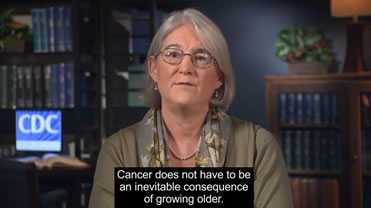Hannah K. Weir, PhD, MSc

In this video abstract, Dr. Weir talks about her work to predict the number of new cancer cases and deaths to the year 2020.
Hannah K. Weir, PhD, is a senior epidemiologist in the Division of Cancer Prevention and Control’s Epidemiology and Applied Research Branch. Prior to coming to CDC, Dr. Weir was an epidemiologist at Cancer Care Ontario (Canada). Dr. Weir’s research focus is primarily in the area of cancer surveillance, with a particular focus on population-based cancer survival.
She received her PhD training in cancer epidemiology at the University of Toronto. Her Masters in epidemiology is from the Department of Environmental Health at the University of Cincinnati, Ohio.
Dr. Weir joined CDC in 1996, where she helped establish the National Program of Cancer Registries’ (NPCR’s) Cancer Surveillance System (NPCR-CSS) to receive, evaluate, and disseminate data from the 48 population-based cancer registries funded by CDC. She also led the first team responsible for publishing the annual United States Cancer Statistics (USCS) report featuring incidence data from NPCR and the National Cancer Institute’s Surveillance, Epidemiology, and End Results Program. Dr. Weir was the first CDC author to lead the Annual Report to the Nation on the Status of Cancer.
In 2008, Dr. Weir received the Constance L. Percy Award for Distinguished Service from the North American Association of Central Cancer Registries (NAACCR) for her work in the cancer surveillance community in promoting collaboration between national and state partners in the collection and use of population-based survival data. Dr. Weir is the Chair of the NAACCR Research and Data Use Steering Committee.
Dr. Weir serves on the steering committees for the CONCORD Programme (global surveillance of cancer survival) and the annual Canadian Cancer Statistics reports. The first CONCORD study was a worldwide analysis of cancer survival in five continents and the first study to use standard quality-control procedures and identical analytic methods for all datasets. It reported that for patients diagnosed and followed through the 1990s, cancer survival for female breast, colon, rectum, or prostate varied widely between and within countries. The study documented that in the United States, cancer survival in black men and women was systematically and substantially lower than in white men and women in all 16 states and six metropolitan areas included.
A second study (CONCORD 2) is underway and will include more U.S. cancer registries, more cancer sites, and expanded global coverage. The study will also include detailed analysis of cancer survival in the United States, including an estimate of the number of avoidable deaths if cancer disparities by race were eliminated.
The most recent articles Dr. Weir has first-authored include—
- 2016 Heart disease and cancer deaths—trends and projections in the United States, 1969–2020.
- 2016 Reply to it is not all black and white: Future incidence of stomach cancer will be substantially higher than projected due to the effects of immigration and increasing Hispanic and Asian populations in the United States.
- 2016 The effect of multiple primary rules on cancer incidence rates and trends.
- 2015 Meeting the Healthy People 2020 objectives to reduce cancer mortality.
- 2015 The past, present, and future of cancer incidence in the United States: 1975 through 2020.
- 2014 Evaluation of North American Association of Central Cancer Registries’ (NAACCR) data for use in population-based cancer survival studies.
- 2013 The effect of multiple primary rules on population-based cancer survival.
- 2011 Melanoma in adolescents and young adults (ages 15–39 years): United States, 1999–2006.
- 2008 Cancer in American Indian and Alaska Native young adults (ages 20–44 years): U.S., 1999–2004.
- 2005 The National Program of Cancer Registries: Explaining state variations in average cost per case reported.
- 2003 Annual report to the nation on the status of cancer, 1975–2000, featuring the uses of surveillance data for cancer prevention and control.
- Page last reviewed: July 22, 2014
- Page last updated: November 28, 2016
- Content source:
- Maintained By:


 ShareCompartir
ShareCompartir